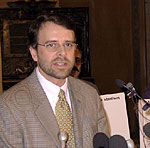Selig says Twins' contraction still 'a possibility'
By Bob Collins
Minnesota Public Radio
March 26, 2002
| |
|
|
|
Major League Baseball Commissioner Bud Selig says the possibility of eliminating one or more teams is "still on the table." Last fall, Selig announced his intention to "contract" two teams - believed to be the Minnesota Twins and Montreal Expo - before the start of the 2003 season. Selig, however, dropped the effort after the Minnesota Supreme Court upheld a lower court ruling requiring the Twins to play baseball in the Metrodome in 2003.
Selig made his comments Tuesday during a "town hall meeting" with fans on the league's Web site (www.mlb.com).
"I know how they feel in areas that have been mentioned as contraction sites, but the economic problems are so serious that some of the solutions are going to be very, very painful," he said. Contraction is something that came from the owners and there has never been an owner or a club that has been negative about contraction in any way. Contraction is certainly on the table as a possible solution."
State legislators said Selig's threat injected a greater sense of urgency at the Capitol this legislative session. The Minnesota House voted 80-52 Monday in favor of stadium legislation that requires little direct funding from the state, but could raise taxes in local communities to help pay for a new ballpark. The plan must now be reconciled with a Senate version passed earlier this month before being sent to Gov. Jesse Ventura.
In his remarks Tuesday, Selig suggested that the Legislature's passing of a stadium bill isn't a guarantee the Twins will survive. He said local investors "must step forward" to buy the team from owner Carl Pohlad.
"I understand the feeling of the fans in Minneapolis, unfortunately everyone wants the problem solved and they want someone else to solve them, and they can't be solved without pain.
"I'm hopeful the Legislature and governor will agree on a comprehensive plan. Certainly this is helpful," he said.
| |
|
|
|
||
During debate in the House Monday, legislators said Selig's threats amounted to "blackmail." In his forum Tuesday, Selig maintained that baseball teams are losing money. "The only people who question the numbers," he said, " are those people who haven't seen them." Selig said the competitive imbalance in the league would be addressed.
Monday's House action carries with it the requirement that baseball "get its economic house in order."
Selig says that after two teams are contracted, the league will consider moving franchises, although he said moving a team, "shifts the problem from A to B and doesn't solve the problem."
Meanwhile, resistance is mounting among St. Paul business owners to proposed bar, restaurant and lodging taxes included in a payment plan for a new Twins ballpark.
About 50 small business owners have signed a petition opposing any new tax, the drive's organizer, Thomas Welna, said Tuesday.
The House-passed bill allows the host city to levy a tax of up to 3 percent on food, beverages and lodging to help repay bonds.
St. Paul is among the cities in contention, but city residents would have to approve a referendum before taxes are enacted.
"What we do mind is the state Legislature deciding to take from one industry and give to another," said Welna, owner of the Covington Inn, a bed and breakfast.
Though, consumers would pay the higher taxes on their tabs, Welna said businesses would suffer because it represents a price increase that doesn't raise their own revenue.
Supporters of the bill say city businesses would benefit from baseball fans who would come to St. Paul and spend money.
Few of the owners who signed the petition operate downtown businesses near potential stadium sites. As many as 775 businesses could be covered by the new taxes. At least three-fourths of the St. Paul Area Chamber of Commerce members back the stadium effort, president Larry Dowell said.
More from MPR
